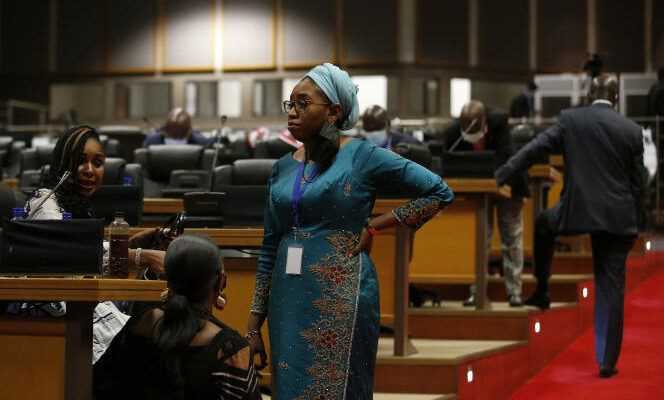To not miss anything on African news, subscribe to the newsletter of World Africa from this link. Every Saturday at 6 a.m., find a week of current events and debates treated by the editorial staff of World Africa.
“Male parliamentarians spend their time making jokes and advances. They come back to it all the time. “A colleague touched my chest. “The men in the party tried to force a woman to have sex with them in order to be a candidate. ” Testimonials from a large joint study conducted by the Inter-Parliamentary Union (IPU) and the African Parliamentary Union (UPA) and published on Tuesday 23 November are damning.
The survey, unpublished on the question in Africa, reveals a sexism “Epidemic and devastating” within the Parliaments of the continent. Thus, 40% of women MPs say they have been sexually harassed during their mandate by a male colleague or an elected member of the opposition. And 23% suffered physical assault, like a Kenyan MP Fatuma Gedi, slapped twice in the courtyard of Parliament in 2019.
Assemblies appear to be unsafe places for women, the majority of assaults taking place there. But for African elected officials, violence can also arise in the streets, during meetings. The report indicates that they are then the target of “Young people mandated by political opponents or by members of terrorist groups”. A deputy who did not wish to reveal her identity, like the 223 other women questioned in the survey, reports: “They tried to kidnap me, shots were targeted at my car during an election campaign. There was one death, but the kidnapping attempt was unsuccessful. “
Forced kisses, slaps on the buttocks
Already in 2016, a global study revealed high levels of violence against women in all parliaments. But African women remain the most vulnerable to sexual violence in political circles. Thus, 39% of elected women on the continent say they have been victims, against 25% in Europe. This gap, the authors of the report explain by political instability as well as by “Social, cultural and religious contexts”. They also note that belonging to a minority, celibacy or disability reinforces the vulnerability of women.
Another noteworthy fact is the significant proportion of sexual assaults perpetrated within Parliaments – forced kisses, slaps on the buttocks or other unwanted touching on the breasts or thighs – reported by 6% of elected officials and 5% of parliamentary officials. “It is very common that you are pushed around to touch your buttocks. Deputies tell us: “You women, you have to be touched before the end of your mandate.”. The hierarchy is aware of these behaviors but does nothing ”, testifies a member quoted in the report.
Faced with this violence, women’s voice is struggling to be freed. Reports remain marginal – only 7% of respondents who have been sexually harassed have alerted the leadership of their parliament. An omerta fueled by the fear of “Lacking loyalty to the party, harming it or having to suffer the indifference or inaction of the parliamentary authorities”. “If we openly criticize, we die politically”, sums up a parliamentarian.
This toxic climate, together with cyberstalking and bullying, contributes to curbing women’s participation in political life. Because according to the study, beyond sexual, physical or verbal assault, gender-based violence is also manifested in the attempt to reduce the voice of politicians. “Men often make noise, speak loudly or leave the chamber when a female colleague or I speak. This gives the feeling of being relegated to the background in the hemicycle and in public life ”, testifies a member. “A male colleague said about me: “Look how romantic she is”, while I was talking about fighting poverty and building roads! “, another rebels.
Verbal aggression during debates
The predominance of men in parliaments tends to reinforce the feeling of impunity and the recurrence of violence against women. Thus, in Senegal, where parity in the National Assembly has been the norm since 2010, open attacks against women seem less frequent, according to Adji Mergane Kanouté, vice-president of the presidential majority group in Parliament. Engaged in politics since 2008, she sees it as a consequence of the feminization of the hemicycle.
However, the MP notes the persistence of verbal attacks during plenary debates: “The point is clearly to denigrate us as women, and it hurts the self-esteem of some. “ Thus, 72% of the respondents affirmed to have been affected morally by these attacks.
To protect women, avoid their exclusion from the political sphere and the discouragement of young aspiring women, the study calls for legislation on the specific case of gender-based violence in politics. Because for the moment, in Africa, only Tunisia recognizes, in its national law, political violence against women and provides for specific sanctions against aggressors.
